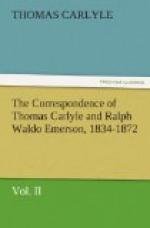—T. Carlyle
CLVIII. Emerson to Carlyle
Concord, 6 May, 1856
Dear Carlyle,—There is no escape from the forces of time and life, and we do not write letters to the gods or to our friends, but only to attorneys, landlords, and tenants. But the planes and platforms on which all stand remain the same, and we are ever expecting the descent of the heavens, which is to put us into familiarity with the first named. When I ceased to write to you for a long time, I said to myself,—If anything really good should happen here,—any stroke of good sense or virtue in our politics, or of great sense in a book,—I will send it on the instant to the formidable man; but I will not repeat to him every month, that there are no news. Thank me for my resolution, and for keeping it through the long night.—One book, last summer, came out in New York, a nondescript monster which yet had terrible eyes and buffalo strength, and was indisputably American,—which I thought to send you; but the book throve so badly with the few to whom I showed it, and wanted good morals so much, that I never did. Yet I believe now again, I shall. It is called Leaves of Grass,—was written and printed by a journeyman printer in Brooklyn, New York, named Walter Whitman; and after you have looked into it, if you think, as you may, that it is only an auctioneer’s inventory of a warehouse, you can light your pipe with it.
By tomorrow’s steamer goes Mrs. —– to Liverpool, and to Switzerland and Germany, by the advice of physicians, and I cannot let her go without praying you to drop your pen, and shut up German history for an hour, and extend your walk to her chambers, wherever they may be. There’s a piece of republicanism for you to see and hear! That person was, ten or fifteen years ago, the loveliest of women, and her speech and manners may still give




